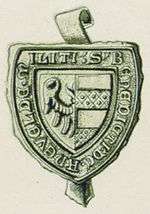Ahlefeldt (noble family)
Ahlefeldt is a German and Danish family of nobility. The family originated from Westensee near Kiel.

The earliest known ancestor is one Benedict von Ahlefeldt, (d c 1340), whose son and grandsons served king Atterdag Valdemar IV of Denmark and received significant pawn fiefs and properties in Denmark.
In Slesvig the family inherited estates Søgård, Nør, Königsförde-Lindau, Sakstorp and Gelting. In Holstein, Bossee, Lehmkulen, Wittmold, Deutsch-Nienhof, Emkendorf, Kl. Nordsee, Haseldorf and Fresenburg.
Godske von Ahlefeldt (d. 1541) was the last catholic Bishop of Slesvig.
High royal councillor Burchard von Ahlefeldt (of Eskilsmark) received in 1672 letters patent as Danish count.
His kinsman Frederik von Ahlefeldt (1623-1686) raised in 1665 to Heiliger Römischer Reichsgraf, i.e. German count in immediate vassalage to the emperor. He further received in the same year as his kinsman, in 1672 the Danish title of count and the position of fiefed count. He inherited the county of Langeland.
One of his grandsons, count Christian Ahlefeldt inherited the county of Laurvig in Norway, one of the two official countships ever in that country (the other was Jarlsberg, which belonged to the Wedel family). In 1785 he received the royal licence to himself and his descendants to bear the name Ahlefeldt-Laurvigen.
Holdings
The Ahlefeldt family accumulated large holdings of land on the territories of today's Germany and Denmark:
- Olpenitz (at Kappeln)
- Saxtorf (at Schwansen)
- Königsförde-Lindau (at the Eider Canal), the County of Langeland with Tranekær Castle
- Barony of Lehn
- Egeskov Castle
- Tranekær Castle, Eriksholm Castle, Fjællebro, Hjortholm, Møllerup, Skovsbo and Ulstrup Castle.
Gallery
.jpg) Detlev von Ahlefeldt (1480-1572)
Detlev von Ahlefeldt (1480-1572).jpg) Benedikt von Ahlefeldt (1492-1513)
Benedikt von Ahlefeldt (1492-1513)_01.jpg) Hans von Ahlefeldt (1620-1694)
Hans von Ahlefeldt (1620-1694).jpg) Burchard von Ahlefeldt (1634-1695)
Burchard von Ahlefeldt (1634-1695)
| Wikimedia Commons has media related to Ahlefeldt. |